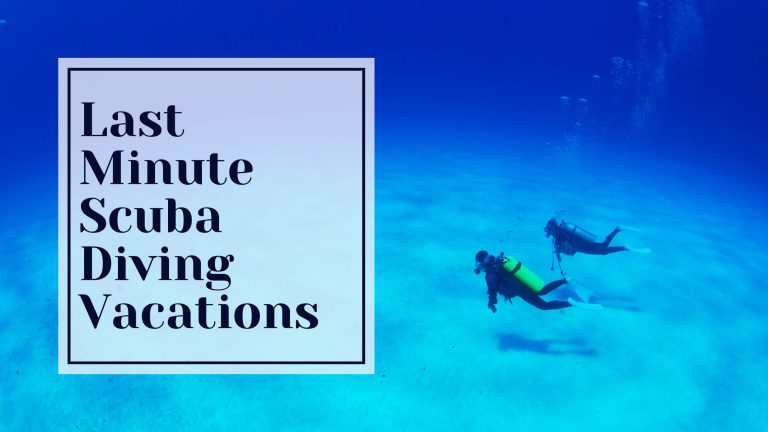Is there a Weight Limit For Scuba Diving?
Scuba diving is a popular and exciting sport that allows you to explore the underwater world. However, some people may wonder if scuba diving has a weight limit. The answer is yes and no. The diver’s weight, diving gear, and any additional weights are considered when determining the weight limit for scuba diving.

We will discuss whether is there a weight limit for scuba diving in this blog post and how proper weighting is essential for safety and comfort. Moreover, the weight limits for scuba diving equipment vary depending on various factors, which we will discuss today.
Is There A Weight Limit For Scuba Diving? A Detailed Answer
Dive into the ocean’s depths and explore the underwater beauty with scuba diving. However, like any other sport or activity, certain guidelines and rules must be followed to ensure the safety and well-being of the diver. One of these guidelines is the weight limit for scuba diving.
- What Are The Weight Limits For Scuba Diving?
Weight limits for scuba diving are set to ensure that divers can safely and comfortably use the equipment and maintain proper buoyancy control during the dive. These limits consider the diver’s weight, gear, and any additional weights needed for buoyancy control. The weight limits for scuba diving vary depending on the type of diving equipment used.
- Why Are Weight Limits For Scuba Diving Important?
Weight limits for scuba diving are essential for several reasons. First and foremost, they ensure the diver’s safety by allowing the diver to comfortably and safely use the equipment.
Additionally, weight limits also help to maintain proper Buoyancy Control during the dive. It is crucial as a diver unable to control their buoyancy may use more air than necessary and could even find themselves in danger if they cannot ascend to the surface safely.
- What Are The Weight Limits For Open Circuit Diving?
Open circuit diving, also known as standard scuba diving, is the most common type. The weight limits for this type of diving are as follows:
- Dive weight belt: 10-15% of body weight
- Exposure suit weight: 5-10% of body weight
- Tank weight: 10-20 lbs
- Total weight: 25-40% of body weight
These weight limits are just general guidelines, and the weight limits for your specific dive equipment may vary. Moreover, consult with a professional diving instructor or dive center to properly fit and configure your diving gear and to check the weight limits for the diving equipment you will be using.
- What Are The Weight Limits For Closed-Circuit Diving?
As with rebreather diving, closed-circuit diving reduces bubble production by recycling exhaled air and using a rebreather unit. Those who dive in this style must not exceed the following weight limits:
- Dive weight belt: 10-15% of body weight
- Exposure suit weight: 5-10% of body weight
- Rebreather unit weight: 20-30 lbs
- Total weight: 30-45% of body weight
You should check the weight limits of your dive equipment because these are just general guidelines. Getting the proper fitting and configuration of your diving gear and checking the weight limits for the diving equipment are also essential steps.
- What Are The Weight Limits For Other Types Of Diving?
Other types of diving, such as technical diving, cave diving, and deep diving, may have different weight limits than those for open-circuit or closed-circuit diving. It is essential to consult with a professional diving instructor or dive center to fit and configure your diving gear properly and to check the weight limits for the diving equipment you will be using.
- Our Verdict
Weight limits for scuba diving are a significant aspect of diving safety. They ensure that divers can safely and comfortably use the equipment and maintain proper buoyancy control during the dive. The weight limits for scuba diving vary depending on the type of diving equipment being used.
- Scuba Diving Weight Limit Chart
| Type of Diving | Dive weight belt | Exposure suit weight | Additional Equipment | Total weight |
| Open Circuit | 10-15% of body weight | 5-10% of body weight | Tank weight: 10-20 lbs | 25-40% of body weight |
| Closed Circuit | 10-15% of body weight | 5-10% of body weight | Rebreather unit weight: 20-30 lbs | 30-45% of body weight |
How Much Weight For Scuba Diving?
Ahoy, there are scuba enthusiasts. How much weight will you need for your next dive? Let me tell you. It is more complex than grabbing a couple of weights and throwing them in your dive bag.
The weight you will need for scuba diving depends on a few factors, like the type of diving equipment you use and your body weight. You will need to consider three main types of weights: dive weight belt, exposure suit weight, and tank weight.
Can Fat People Scuba Dive?
Yes, people of all sizes and body types can scuba dive. However, divers must ensure that their body weight and size are considered when selecting and fitting diving equipment.
The diver needs to be comfortable and safe while diving, so choosing the proper size wetsuit, BCD, and other diving equipment is crucial to ensure an appropriate fit and function. Some divers may need to use larger or specialized equipment to accommodate their size.

For overweight or obese divers, discussing any potential health concerns with their physician before participating in scuba diving is recommended. Some health conditions may make scuba diving inadvisable.
Scuba diving equipment manufacturers and models set weight limits differently. We always suggest checking the weight limit of the equipment you want to use before diving.
Additionally, it is necessary for all divers, regardless of body type, to pay attention to their buoyancy control. It is essential for safety and comfort underwater and allows for proper weighting.
People of all sizes and body types can perform scuba dive. Still, it is crucial to consider the diver’s comfort and safety when selecting and fitting diving equipment and to check the weight limits of the equipment before diving.
Frequently Asked Questions (FAQs)
Final Words
While there are weight limits for scuba diving equipment, these limits depend on your gear. Divers need to consult with a diving instructor or dive center to properly fit and configure their diving gear and check the weight limits for the equipment they will be using. By following weighting guidelines and paying attention to buoyancy control, divers of all sizes can enjoy the underwater world.






